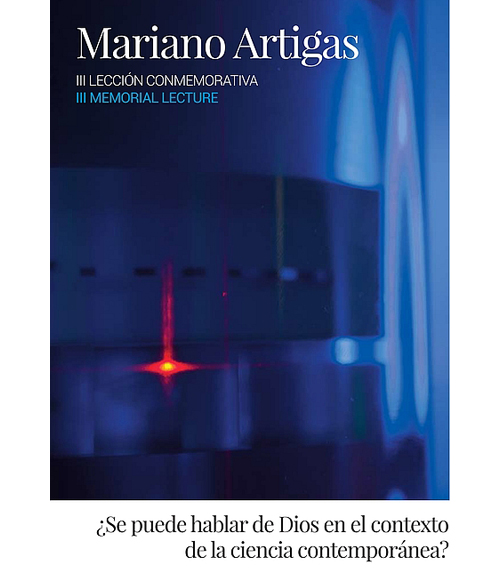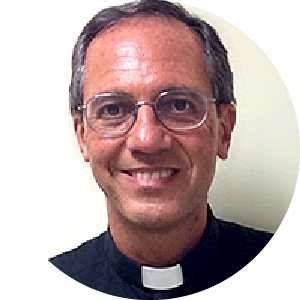Lesson 2015: Can we talk about God in the context of contemporary science?

Full text:
A simple glance at the section of books on scientific knowledge dissemination in a bookshop of our cities would show us today that not a few books have the word "God" on their cover. In English-language works, in the systematic index by concepts, the term God has already conquered a space of its own among other terms such as General Relativity and Grand Unified Theory. Although part of this phenomenon, as some authors admit, is due to the fact that the Big Questions still attract the public today - the questions of whether the universe has a Creator and whether life has its origin in God are precisely examples of these big questions - it is significant that the notion of God has become the subject of discussion in a field, science, where we would not expect it. Nevertheless, Albert Einstein had already put us on notice some years ago when he stated that he was not interested in a particular phenomenon or in the meaning of a particular line in a spectrum of light; what attracted him was to find out how God had created the world. Some thinkers have observed that the "God question", ignored by the 20th century Philosophy because it was considered too compromising a question in a climate of weak and relativistic thinking such as the one we are living in, is unexpectedly re-emerging in science. Some scientists (or those who disseminate their discoveries) are indeed convinced, like Paul Davies, that science today offers us more reliable paths to God than those offered by religions; others, like Stephen Hawking, are convinced that contemporary science can easily show that the universe does not need a Creator. How to reconcile these very different conceptions? It may also be worth recalling the areas of the scientific research , or the reflections developed from it, which make reference letter today the notion of God, or equivalent notions (Creator, Absolute, Understanding, Orderer, etc.), in order to affirm or deny it. This notion seems to arise in three main areas: (a) the problem of the origin of physical reality, especially in cosmology; (b) the question concerning the intelligibility of nature and the origin of natural laws, and thus its relation to mathematics and the natural sciences; (c) the discussion on the possibility for the sciences to affirm or deny the existence of a finality in nature, as happens in biology at purpose of the discussion on the "engines" of evolution or on Intelligent Design, or also in cosmology, when the thesis of the Anthropic Principle are exposed. In this Lesson we will try to examine more closely the philosophical reasons why the topic of God is back at the centre of the discussion in the scientific context, because we will ask ourselves if, in this context, the notion of God the Creator has a meaning or, on the contrary, if it has no meaning at all. An author like Mariano Artigas was particularly sensitive, in his writings, to the topic that now interests us and we would like to try to start as he would have done, that is, by first clarifying what our epistemological criteria are.
(1) Cf. Summa theologiae, I, q. 2, a. 3.
(2) M. Artigas, The Mind of the Universe, Templeton Foundation Press, Radnor 2000, p. xix.
(3) P. Davies, Dio e la nuova física, Mondadori, Milano 2002, p. 298. (The translation is ours).
(4) L. De Broglie, Fisica e Metafisica, Einaudi, Torino 1950, p. 216. (The translation is ours).
(5) A. Einstein, "Fisica e realtà" (1936), in Opere scelte, Bollati-Boringhieri, Torino 1988, p. 530. (The translation is ours).
(6) A. Einstein, "Lettera a M. Solvine", 30.3.1952, in idem, p. 740. (The translation is ours).
(7) A. Einstein, Come io vedo il mondo, Newton Compton, Rome 1988, p. 32. (The translation is ours).
(8) P. Davies, The Mind of God, Mondadori, Milan 1993, p. 7. (The translation is ours).
(9) F. Dyson, Turbare l'universo, Boringhieri, Torino 1979, pp. 290-291. (The translation is ours).
(10) W. Heisenberg, Fisica e oltre, Boringhieri, Torino 1984, p. 225. (The translation is ours).
(11) J. Polkinghorne, Scienza e Fede, Mondadori, Milano 1987, p. 72. (The translation is ours).
(12) M. von Laue, History of Physics, Academic Press, New York 1950, p. 4. (The translation is ours).
(13) G. Simpson, Evoluzione. Una visione del mondo, Firenze 1972, p. 213. (The translation is ours).
(14) M. Artigas, The Mind of the Universe, p. 331: "A religious attitude basically implies openness toward God and a new outlook that stems from the contemplation of the divine dimensions of the world and every one of its parts, especially other human beings. Insofar as scientific progress favors this outlook, it can be considered a source of religious inspiration".


Prof. Giuseppe Tanzella-Nitti
Full Professor of Fundamental Theology, Pontifical University of the Holy Cross, Rome.
He has been researcher in radio astronomy at the CNR in Bologna and astronomer at the Turin Observatory.
publisher of the Interdisciplinary Dictionary of Science and Faith (DISF).
Further information.
Date and time: Tuesday, 20 October 2015, at 12 noon.
Venue classroom Magna. Central Building . University of Navarra. Pamplona
Funding: Activity carried out with funding from the Templeton Foundation.
